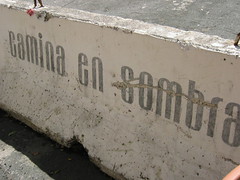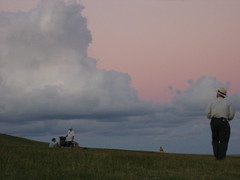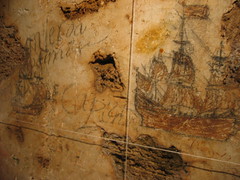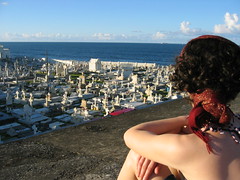“I’m from Brooklyn. My parents came over from Russia.” So says Lee Krasner to Jackson Pollack (Marcia Gay Harden to Ed Harris) in the movie “Pollack.”
With this in the background right now, I realize how, oddly, I think so much lately (lately=years and years) about my grandparents, whom I never knew, the ones who came over from Russia. It is a family saga probably like Krasner’s, probably like every Jew in New York’s. But it is a segment of a slice, something that informs a group of us, a thing that makes us strive, because of, or in spite of. Something worth telling, if only for its specificity.
Little good as an excuse, but more in way of explanation, I live these days because of, or in spite of them, these ancestors, and feel like writing in this space would require an expiation of that, of that spiegation (Italian-English jumble of a word) of immigration. But, of course, I am still figuring it out, as we are all figuring out our heritage—those of us who have entire family albums, and those, like me, who have nothing but scraps of memories, a few black and white photographs that were not trashed in a fit of uncaring, memories now reluctantly pulled from a dearth of living relatives who would rather not think back to those days. But why? Why? Really, why? I’ve tried to ask—I’ve succeeded less than I’d hope, and the answers are less than full, like the small circle of water in a toilet that won't fill properly.
My father remembers his grandfather speaking Yiddish when he lived with the family in their Brooklyn house for a while. That would have been in the 1940s, I think. And now, I recognize small phrases, like, “Gay aveck!” (“Go away!” my father laughed at our dogs when I was a child), but after that, Yiddish-wise, the words sound familiar, but it’s a lingua lost, mostly.
At my young cousin’s funeral last year (she was no more than 47, I’d say—another anomaly in a family of lengthily spaced-out relations—i.e. my being so much younger than her, my father being a child of 0 to his brother of 12) I saw the ease with which we will lose them all—the only people who have any connection to my past.
I am the last of my line—literally—with my name having been created on Ellis Island as an Americanized abbreviation of a Russian last name. I’m not even sure how you would have pronounced the original in Russian, or if it was even actually Russian or some kind of Romanian-Russian dialect.
Where and when will it end? Can you even call it a line when it was only two generation’s worth? Or does that count as three? What are our—my—obligations to discover that past before it is all over? And, I suppose I should ask, when does it all end, anyway?









